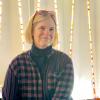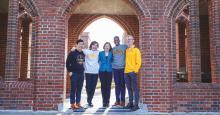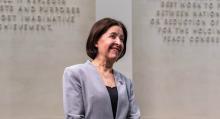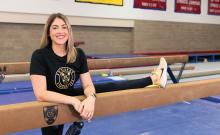He is not a war correspondent, he assures. He is more what you might call a professional traveler.
Raised in Duluth by Scottish and Irish parents, he spent time in both countries growing up. As an adult, he imported Persian rugs and other international art and objects.
Then, in 2007, he teamed up with another Ian (cinematographer Ian Levasseur)‚ for a Travel Network show, The Relic Hunter with Ian Grant. It won an Emmy in 2010. In 2021, the two made Culture Quest for PBS, which won another Emmy in 2024. On Culture Quest, the team explores the world through the eyes of artists, artisans, and keepers of culture. “The art is just a window into these cultures,” Grant says. “It’s a way to start talking about larger issues.”
Such as war. For the latest Emmy-winning episode, Grant spent part of 2022 in Ukraine, filming a special on Ukrainian response to war with Russia. He interviewed street artists, muralists, an electro-folk group, and curator of Artists Support Ukraine. All make art in the midst of, and in response to, war. (Watch at culturequest.tv.) It was the art that spurred him to go. “This one guy in particular, he was in a bomb shelter with this family for months, no materials except for a pen and a pad. He started sketching images of this family, and through social media those sketches got into the world. That spoke to me.” Ukrainians, he says, will be the first to tell you they’re having [global support] because artists’ work gets out. “To me, that is the perfect use of art.”
Grant has been collaborating with Gustavus to bring lessons from his travels to Gustavus students in Saint Peter, particularly in professor Mimi Gerstenbauer’s Politics of Developing Nations course. “Before we go out to film in each location, I meet with each class and talk about what I’m going to see and do and how it applies to their coursework,” he says. “Then, students log into a website where I post every day about what I’ve seen and done and the students ask questions.” The collab culminates in Zoom interviews. For instance, Gustavus students conversed with same-aged Mongolian nomads, as well as someone who helped lead East Timor’s independence.
“In today’s world, it’s hard to get past our differences,” Grant says. By showing artists and artistans around the world who have similar day-to-day struggles as a farmer in North Dakota or a carpenter in Chicago, he’s hoping to show our commonalities rather than differences. “It all comes back to global commonality.”
It’s been a long and classically liberal arts journey for this history and accidental art history double major who took a role in the spring play despite enrolling in Set Design to pound nails. “At Gustavus, my professors would say, ‘Go after it! Chase that! That’s been an invaluable thing.”
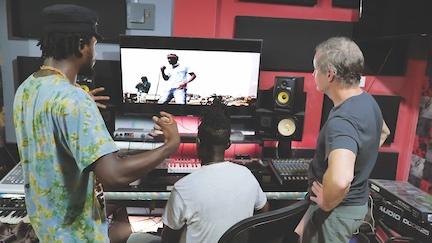
Grant with hip hop artist and poet Kwame Aidoo in
Accra, Ghana.
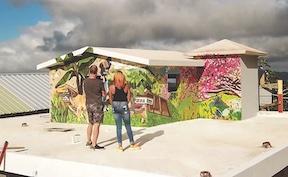
in Puerto Rico.
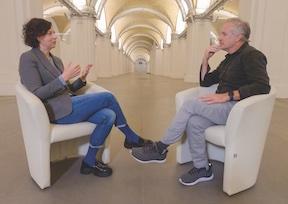
the Ukranian Museum Mystetskyi Arsenal
Olesia Ostrovska-Liuta in Kyiv, Ukraine.

